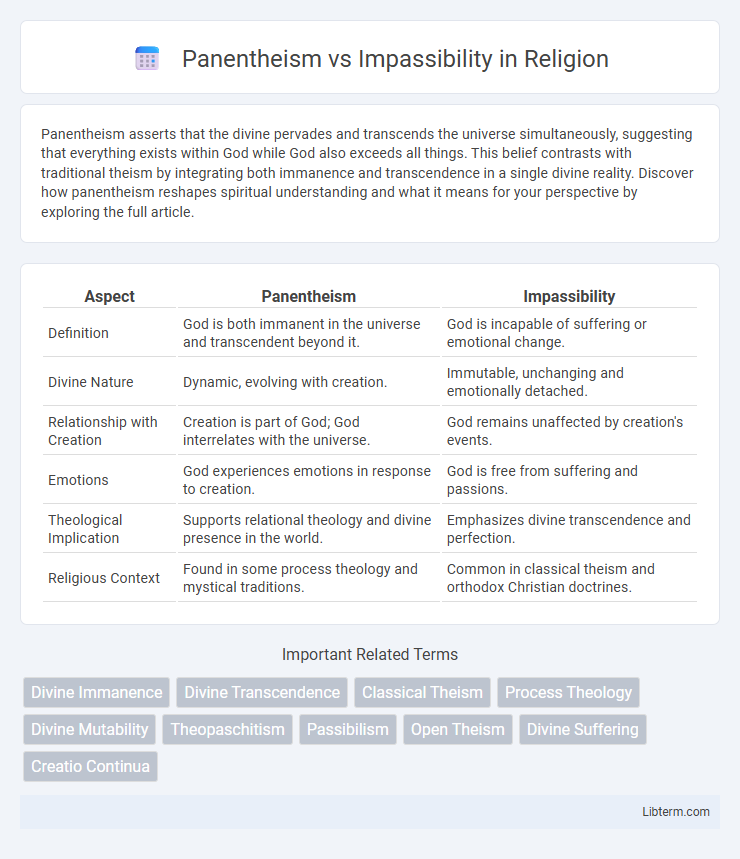Panentheism asserts that the divine pervades and transcends the universe simultaneously, suggesting that everything exists within God while God also exceeds all things. This belief contrasts with traditional theism by integrating both immanence and transcendence in a single divine reality. Discover how panentheism reshapes spiritual understanding and what it means for your perspective by exploring the full article.
Table of Comparison
| Aspect | Panentheism | Impassibility |
|---|---|---|
| Definition | God is both immanent in the universe and transcendent beyond it. | God is incapable of suffering or emotional change. |
| Divine Nature | Dynamic, evolving with creation. | Immutable, unchanging and emotionally detached. |
| Relationship with Creation | Creation is part of God; God interrelates with the universe. | God remains unaffected by creation's events. |
| Emotions | God experiences emotions in response to creation. | God is free from suffering and passions. |
| Theological Implication | Supports relational theology and divine presence in the world. | Emphasizes divine transcendence and perfection. |
| Religious Context | Found in some process theology and mystical traditions. | Common in classical theism and orthodox Christian doctrines. |
Understanding Panentheism: Core Concepts
Panentheism posits that God encompasses and interpenetrates the universe while also transcending it, maintaining both immanence and transcendence simultaneously. This concept contrasts with divine impassibility, which asserts that God does not experience suffering or emotional change. Understanding panentheism involves grasping its core idea that God's nature is dynamic and relational, engaging with creation without being limited or changed by it.
Defining Divine Impassibility
Divine impassibility refers to the theological doctrine that God is incapable of experiencing pain, suffering, or emotional change, maintaining an unchanging and perfect nature. Panentheism, which posits that God interpenetrates the universe while transcending it, often challenges this notion by emphasizing a dynamic, relational deity affected by creation. The tension between panentheism and divine impassibility centers on whether God's nature includes emotional responsiveness or remains immutable and unaffected by the temporal world.
Historical Contexts: Theological Roots
Panentheism, rooted in Neoplatonic philosophy and early Christian mysticism, emphasizes God's immanence while transcending creation, contrasting sharply with the traditional doctrine of divine impassibility that originated in Patristic theology to assert God's freedom from suffering and emotional change. Theological figures such as Gregory of Nyssa and Origen contributed to Panentheistic ideas, whereas Augustine and Thomas Aquinas solidified impassibility as a cornerstone of classical theism, shaping medieval and scholastic interpretations. These divergent views reflect foundational debates on God's nature, presence, and interaction with the world during the formation of early and medieval Christian doctrine.
God’s Relationship with the World: Panentheistic Views
Panentheism posits that God interpenetrates every part of the universe while simultaneously transcending it, highlighting an intimate and dynamic relationship between the divine and the cosmos. This view contrasts with classical divine impassibility, which asserts that God is unaffected by temporal processes or emotional changes. Panentheistic perspectives emphasize God's ongoing interaction and responsiveness to the world, portraying a relational and evolving deity rather than an unchangeable, distant power.
Impassibility: God’s Unchanging Nature
Impassibility refers to the theological concept that God is unchanging and unaffected by external emotions or events, emphasizing divine immutability and perfect self-sufficiency. In contrast to panentheism, which suggests God interpenetrates and is affected by the universe, impassibility underscores God's transcendence and consistent nature beyond temporal fluctuations. This doctrine highlights that God's essence remains constant, ensuring divine perfection and eternal sovereignty.
Scriptural Interpretations and Debates
Scriptural interpretations of Panentheism emphasize God's immanence, suggesting the divine interpenetrates the universe, while debates on Impassibility highlight God's transcendence and emotional incorruptibility as seen in classical theism. Passages such as Psalm 139 and Colossians 1:17 support God's intimate involvement with creation, contrasting with interpretations of Exodus 3:14 and Malachi 3:6 that affirm divine immutability and impassibility. Debates arise over whether biblical narratives of God's emotions imply change and suffering, challenging traditional doctrines and fostering diverse theological positions on God's nature.
Philosophical Implications of Divine Passibility
Philosophical implications of divine passibility in panentheism challenge classical notions of God's immutability and impassibility by positing a divine nature that is dynamically responsive to temporal events and creatures. This view supports a God who experiences change and relational engagements, suggesting an interactive cosmos where the divine absorbs and processes temporal suffering and joy. Such theological perspectives provoke reevaluation of metaphysical attributes, emphasizing a God intimately involved with creation rather than detached or unaffected by worldly vicissitudes.
Criticisms of Panentheism and Impassibility
Criticisms of panentheism often focus on its ambiguous portrayal of divine interaction, where God's simultaneous immanence and transcendence may lead to logical contradictions or dilute divine sovereignty. Impassibility faces scrutiny for portraying God as emotionally immutable, which some argue disconnects the divine from genuine relational engagement with creation. Both positions confront challenges in harmonizing divine attributes with the experiential realities of suffering and change.
Contemporary Perspectives in Theology
Contemporary theology explores panentheism as a dynamic view where God interpenetrates the universe while remaining distinct, emphasizing relationality and divine immanence. In contrast, the impassibility doctrine asserts that God is not subject to suffering or emotional change, maintaining divine transcendence and immutability. Current debates center on reconciling God's intimate engagement with creation in panentheism with classical assertions of divine impassibility, highlighting evolving interpretations in process theology and open theism.
Panentheism vs Impassibility: Key Takeaways
Panentheism asserts that God interpenetrates every part of the universe and extends beyond it, emphasizing a dynamic, relational deity that experiences change and interacts with creation. Impassibility, in contrast, holds that God is incapable of suffering or emotional change, maintaining eternal immutability and transcendence beyond worldly influences. The key takeaway lies in how Panentheism embraces a responsive and evolving divine presence, while Impassibility insists on a static, unaffected nature of God.
Panentheism Infographic

 libterm.com
libterm.com